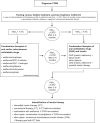Cardiovascular disease and intensive glucose control in type 2 diabetes mellitus: moving practice toward evidence-based strategies
- PMID: 19898642
- PMCID: PMC2773745
- DOI: 10.2147/vhrm.s4808
Cardiovascular disease and intensive glucose control in type 2 diabetes mellitus: moving practice toward evidence-based strategies
Abstract
Type 2 diabetes mellitus (T2DM) is associated with a high risk of complications, essentially macrovascular events. Surprisingly, the effect of improved glucose control on coronary and cerebrovascular complications and the target level of glycated hemoglobin (HbA(1c)) in this population remains questionable. We here report the results of 4 recently published randomized controlled trials (ACCORD, ADVANCE, VADT, UKPDS post-trial), which did not demonstrate a significant reduction of cardiovascular events in the intensive group compared to the standard group. On the contrary, in ACCORD, the study with the most ambitious goal (HbA(1c) < 6%), the overall and cardiovascular mortality was greater in the intensive group, although the risk of microangiopathic complications, especially nephropathy, was significantly decreased. VADT suggests that one possibility for the lack of observed effect of intensive therapy could be that the cardiovascular benefit is delayed. This contrasts strongly with the long-term postintervention outcomes of UKPDS, which show a persistent benefit of glycemic control during 10 years of post-trial follow-up ('legacy effect'). Therefore, the best way to protect patients with T2DM against coronary and cerebrovascular disease is to target all cardiovascular risk factors as early as possible by an individualized approach.
Trial registration: ClinicalTrials.gov NCT00000620 NCT00032487 NCT00145925.
Keywords: ACCORD; ADVANCE; UKPDS post-trial; VADT; cardiovascular; glycemic control.
Figures

References
-
- Solomon CG. Reducing cardiovascular risk in type 2 diabetes. N Engl J Med. 2003;348(5):457–459. - PubMed
-
- Gaede P, Pedersen O. Target intervention against multiple-risk markers to reduce cardiovascular disease in patients with type 2 diabetes. Ann Med. 2004;36(5):355–366. - PubMed
-
- Gaede P, Vedel P, Larsen N, Jensen GVH, Parving HH, Pedersen O. Multifactorial intervention and cardiovascular disease in patients with type 2 diabetes. N Engl J Med. 2003;348(5):383–393. - PubMed
-
- Gaede P, Lund-Andersen H, Parving HH, Pedersen O. Effect of a multifactorial intervention on mortality in type 2 diabetes. N Engl J Med. 2008;358(6):580–591. - PubMed
-
- Skyler JS, Bergenstal R, Bonow RO, Buse J, Deedwania P, Gale EAM, et al. Intensive Glycemic Control and the Prevention of Cardiovascular Events: Implications of the ACCORD, ADVANCE, and VA Diabetes Trials: A position statement of the American Diabetes Association and a scientific statement of the American College of Cardiology Foundation and the American Heart Association. Diabetes Care. 2009;32(1):187–192. - PMC - PubMed
Publication types
MeSH terms
Substances
Associated data
LinkOut - more resources
Full Text Sources
Medical
Miscellaneous

